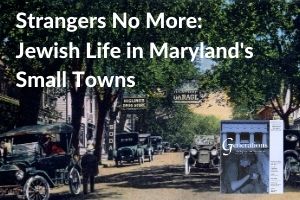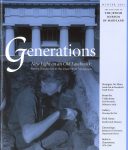Sidebar 3: A Letter from Brunswick, 1917

 Part 8 of “Strangers No More: Jewish Life in Maryland’s Small Towns. Missed the beginning? Head there now! Written by Karen Falk, former JMM curator. Originally published in Generations – Winter 2001. If you would like to purchase a hard copy of this issue, please contact our shop, Esther’s Place, at 443-873-5179 or email info@jewishmuseummd.org.
Part 8 of “Strangers No More: Jewish Life in Maryland’s Small Towns. Missed the beginning? Head there now! Written by Karen Falk, former JMM curator. Originally published in Generations – Winter 2001. If you would like to purchase a hard copy of this issue, please contact our shop, Esther’s Place, at 443-873-5179 or email info@jewishmuseummd.org.
The following letter was originally published in The Jewish Comment on August 24, 1917. The Jewish Comment was published in Baltimore from 1895 to 1918, functioning in the community much like the Baltimore Jewish Times today.
The writer, Himan N. Werntz, was born in Lithuania in 1881, and emigrated to Baltimore in 1902. Shortly thereafter, he arrive in Brunswick to work for V. Kaplon Company, Brunswick’s leading department store, and to serve the community as a Hebrew teacher. In 1907, he and his brother-in-law opened a combination clothing and grocery store.
In the September 14, 1917 issue of The Jewish Comment, Werntz clarifies that “the Jewish population of this popular railroad town numbers about 14 families. Every Jewish family here conducts a strictly kosher house. Through the work of the entire Jewish community a movement was launched last winter to erect a modern synagogue here.” Although Beth Israel Congregation’s synagogue was completed and dedicated on June 8, 1919 amid great expectations, its use as a place of worship appears to have ended by the early 1930s. Mr. Wentz moved his family to Baltimore in 1920, although he maintained his business in Brunswick until just before his death in 1961.
To the Editor
Sir:
There was a time when the Jew looked with much disfavor upon the small towns of this country. No Jew was eager to live in a small country town and when forced to move to a small town it was considered only a temporary home, as it afforded an opportunity to live very economically, in order, later, to move to a city among his fellow-brethren. The Jew was considered a stranger among his Gentile neighbors. He failed to take interest in the welfare of the small town. In municipal affairs the Jew was lax. The feelings of the Gentiles were aroused sometimes, and they considered us a race or nation of money-lovers.
But matter and circumstances changed. It is quite different now. It is quite a usual phenomenon to see a large number of our people move to small towns to make a permanent home. Persons who moved to the city and got rid of all their country savings turn their eyes back to the sweet old country; they love the surroundings, the healthy climate, the pure air and the pure and fresh food. The Jewish settlement in the small and large country towns is growing rapidly. The interest and the welfare of the community are familiar to us. The Jews take part in nearly everything touching the improvement of the community. In municipal affairs the Jews learned to produce strength and ability. In financial institutions the Jews is a good fact, and, in fact, the Gentiles consider us good financiers and trusty persons and the success of a number of the country banks is largely attributed to the support and work of the Jews. We are respected in general and the future is bright. The small towns can become populous Jewish centers, with a healthy future generation. In short, the financial situation of the Jews in the small towns is improving, together with the growth of the community.
But while the financial conditions are considered good and substantially strong, the spiritual and religious situation is much to the contrary. The religious situation is deplorable. While every church in the country is endeavoring to organize Sunday Schools and other associations, the tendency of the Jews in the small towns toward improving Judaism is developing very slowly or not at all.
While nearly every Jewish settlement possesses a synagogue or contemplates the erection of one, they conduct services only during Rosh Hashanah and Yom Kippur. A number of Sabbath and Sunday Schools were organized, but in vain. There is no attraction and consequently the children fail to attend. The majority of the small towns have no rabbi to visit them. They have teachers who are strangers to our literature and to our wonderful history and, or course, have little knowledge or none at all of Hebrew. Such teachers are not fit even to teach a Sabbath or Sunday School. Inasmuch as the children receive no other Jewish education there are some Chedorim conducted by the Shochet of the town and in nearly all cases he has no system or knowledge of pedagogies. The situation is growing critical. The children know little of our religion, of our history, and the future generation will have very little love for his people.
We must open wide our eyes and protect our children and ourselves. We must look out for the fruit. The voice of God is roaring, “Take good care of thy youngsters. Protect their young and soft hearts from dust and faults, so they will grow up and stay with you.” Reform or Orthodox, but Jews they shall be. Where are our religious leaders? Have they ever visited a small town? It is up to our rabbis to try to be in touch with the situation. It is up to them to investigate. It is up to them to find the remedy.
The Jewish Comment, the only Jewish magazine in this section, helps much the cause of Judaism in general. Although devoted principally to Reform Judaism, I feel sure that its columns are open for Orthodox as well as Reform leaders to discuss the subject of remedying Judaism. Let there not be any friction and division wherever it touches on Judaism. Zionist and anti should join hands and drop politics and work for this worthy and most important cause. Now is the proper time and opportunity and the opportunity knocks at our doors. Rabbis and laymen let me hear your voices. The Jews in the country towns are ready to assist you and to obey your commands. I appeal to you with sincere feelings, being familiar with conditions in the small towns. Help us rear good Jews in the small towns. We need your assistance, your advice, your teachings and knowledge.
Will my appeal remain like a voice in a desert?
H.N. Werntz
Brunswick, Md.
~The End~
